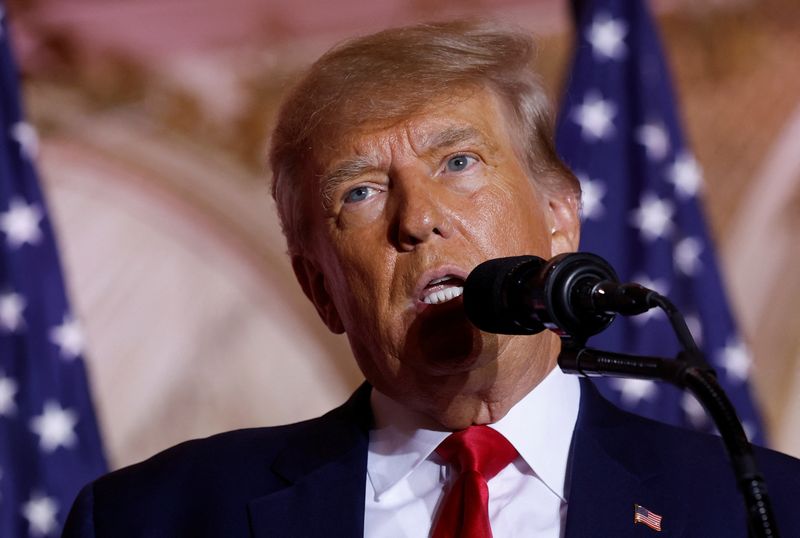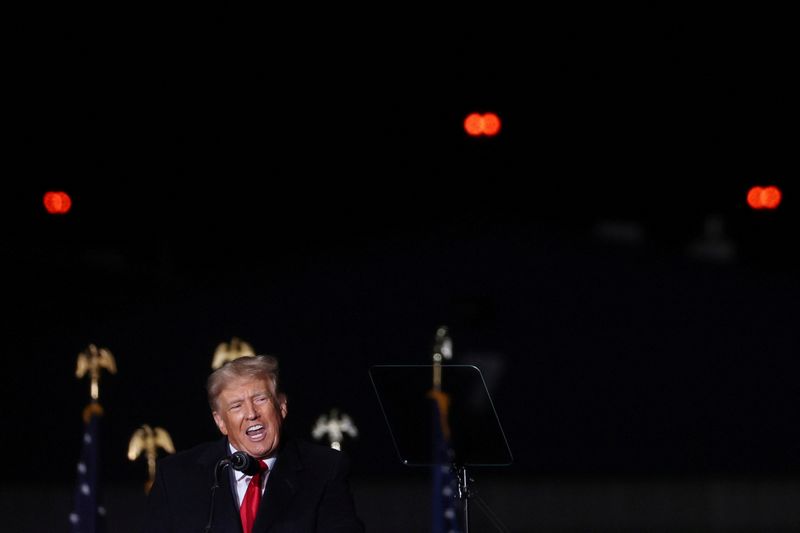By Luc Cohen
NEW YORK (Reuters) - Jurors heard starkly different views on Thursday on whether to convict former President Donald Trump's real estate company of tax fraud, with the prosecution describing a culture of wrongdoing at the Trump Organization and the defense blaming the greed of the government's star witness.
In closing arguments at the criminal trial, defense lawyer Susan Necheles said Trump knew nothing about and deserved no blame for the misconduct of Allen Weisselberg, the company's longtime chief financial officer, who pleaded guilty and testified for the prosecution.
"We are here today because of one reason and one reason only - the greed of Allen Weisselberg," Necheles told the 12-person jury in a New York state court in Manhattan. "The purpose of Mr. Weisselberg's crimes was to benefit Mr. Weisselberg."
Joshua Steinglass, a prosecutor with the Manhattan district attorney's office, said Weisselberg was a product of the "culture of fraud and deception" at Trump's company, and not its only tax fraud beneficiary.
"He also intended to benefit the defendants, even if to a far lesser extent," Steinglass said. "And that is enough to make those corporations criminally liable."
Steinglass added that Trump, who was not charged in the case, "knew exactly what was going on with his top executives."
The Trump Organization was charged in July 2021 with paying personal expenses for some executives without reporting the income, and compensating them as if they were independent contractors, in a 15-year scheme to cheat tax authorities.
If convicted on all nine counts it faces, the company faces up to $1.6 million in fines.
Weisselberg is expected to serve five months in jail after pleading guilty to tax fraud and other charges. He is on paid leave after having worked for Trump's family for half a century.
Closing arguments are expected to continue on Friday, with jury deliberations beginning on Monday. Justice Juan Merchan has presided over the trial, which began on Oct. 24.
To prove the Trump Organization's guilt, prosecutors must show that Weisselberg and other executives acted as "high managerial agents" when they carried out tax fraud, and intended to benefit the company in some way.
Weisselberg testified that he improperly received bonus payments as non-employee compensation and hid from tax authorities various payments from the company for his rent, car leases and other personal expenses.
Some of his testimony may have helped the defense. He told jurors his greed motivated him to cheat on taxes, and described the company's modest payroll tax savings as a "byproduct." At one point, he choked up on the stand while describing his embarrassment at violating the Trump family's trust.
Necheles told jurors: "The issue here is not whether as a byproduct the company saved some money. ... His intent was to benefit himself, not the company."
Donald Bender, an outside accountant with the firm Mazars USA who was granted immunity from prosecution, was the main defense witness. He testified that he trusted Weisselberg to give him accurate financial information for the company's tax returns, and had no obligation to investigate further.
Necheles told jurors Bender should have blown the whistle on Weisselberg.
"Bender failed," she said.
Steinglass urged jurors to dismiss the defense's "far-fetched argument" that Trump's company relied on Mazars to catch wrongdoing.
Mazars cut ties with the Trump Organization in February.
Trump, a Republican, has called the charges politically motivated. Manhattan District Attorney Alvin Bragg, who attended Thursday's closing arguments, is a Democrat, as is his predecessor Cyrus Vance, who brought the charges last year.

The case is separate from New York Attorney General Letitia James's $250 million civil lawsuit accusing Trump, three of his adult children and his company of overstating asset values and Trump's net worth to get favorable bank loans and insurance coverage.
Trump also faces federal investigations into his removal of government documents from the White House after leaving office and efforts to overturn his 2020 election loss, and a Georgia state probe over attempts to undo his election defeat there.
